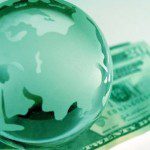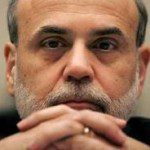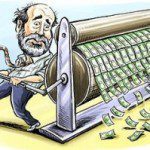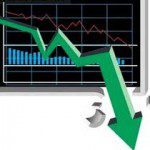I’m not worried about the threat of higher interest rates hurting stocks [because]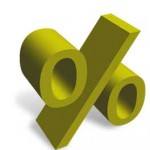 the fact is that rising interest rates are actually a good sign for the stock market. Let me explain…
the fact is that rising interest rates are actually a good sign for the stock market. Let me explain…
So writes Tyler Laundon (wyattresearch.com) in edited excerpts from his original article* entitled Don’t Worry About Interest Rates.
[The following article is presented by Lorimer Wilson, editor of www.munKNEE.com and the FREE Market Intelligence Report newsletter (sample here) and may have been edited ([ ]), abridged (…) and/or reformatted (some sub-titles and bold/italics emphases) for the sake of clarity and brevity to ensure a fast and easy read. This paragraph must be included in any article re-posting to avoid copyright infringement.]
Laundon goes on to say in further edited (and paraphrased in some instances) excerpts:
There are so many variables that it’s impossible to accurately predict the Fed’s next move. A better approach is to follow the Fed’s actions and plans for the future [and] then look at how stocks have performed in the past during similar situations.
The Fed is not prone to knee-jerk reactions. It doesn’t stand to benefit by trying to fake you out. It generally tries to tell the market what its intentions are. It simply requires careful listening to follow along and, right now, the Fed is telling us that it intends to keep rates low but that, as the economy improves, it expects to “taper” its bond buying program, and eventually start moving rates incrementally higher. Does that mean we should sell stocks now, before the Fed raises rates? Absolutely not.
History clearly shows that stocks don’t fall during periods of rising interest rates. Sure, they might fall a little when a rate hike is announced – maybe for a week or so – but they usually bounce back quickly – and then they go higher.
The following chart shows the long-term performance of the S&P 500 Index and the Federal Funds Rate dating back to 1980. The Fed Funds rate is the rate the Fed sets for banks to lend to one another, and it is widely viewed as the benchmark for interest rates.
I’ve placed four blue boxes highlighting time periods when the Fed Funds rate was rising.
- The first time, from 1983 to mid 1984, the S&P 500 rose by 11%.
- Then, in the beginning of 1988 when the Fed began raising interest rates again, the index rose another 16%.
- In 1994 and 2000, when the Fed raised rates, the same result occurred yet again.
- Finally, from 2004 to 2007, as interest rates rose, so too did the market, this time by 26%.
During this entire 33 year period, interest rates were considerably higher than today and every time the Fed raised interest rates, stock prices rose. The market didn’t immediately go up following an announcement. Instead, it was in the months and year(s) that followed.

There are a lot of factors that make stocks go up or down and I’m not pretending to have a crystal ball, or say that interest rates are the only thing that matter (they’re not) but I do know that the best thing for stocks over the long-term is a healthy and growing economy with high productivity and low unemployment and that’s exactly what the Fed is waiting for.
Conclusion
When the Fed starts raising interest rates, we’ll know that this economic recovery can stand on its own two feet and, since history shows that rising interest rates are a sign of economic health and good stock market performance, my advice is to embrace the move as soon as it comes.
[Editor’s Note: The author’s views and conclusions in the above article are unaltered and no personal comments have been included to maintain the integrity of the original post. Furthermore, the views, conclusions and any recommendations offered in this article are not to be construed as an endorsement of such by the editor.]
*http://www.wyattresearch.com/article/dont-worry-about-interest-rates/30157 (Join Daily Profit today and get our unique perspective and investment ideas in your inbox every day. Please go here and tell us where we can send your free subscription.)
Related Articles:
1. Rapid Rise In Interest Rates Will Collapse U.S. Financial System – Here’s Why
There is one vitally important number that everyone needs to be watching right now, and it doesn’t have anything to do with unemployment, inflation or housing. If this number gets too high, it will collapse the entire U.S. financial system. The number that I am talking about is the yield on 10 year U.S. Treasuries. Here’s why. Words: 1161; Charts: 2 Read More »
2. Rising Interest Rates Could Plunge Financial System Into a Crisis Worse Than 2008 – Here’s Why
If yields on U.S. Treasury bonds keep rising, things are going to get very messy. What we are ultimately looking at is a sell-off very similar to 2008, only this time we will have to deal with rising interest rates at the same time. The conditions for a “perfect storm” are rapidly developing, and if something is not done we could eventually have a credit crunch unlike anything that we have ever seen before in modern times. Let me explain. Read More »
3. Another Crisis Is Coming & It May Be Imminent – Here’s Why
Is there going to be another crisis? Of course there is. The liberalised global financial system remains intact and unregulated, if a little battered…The question therefore becomes one of timing: when will the next crash happen? To that I offer the tentative answer: it may be imminent…[This article puts forth my explanation as to why that will likely be the case.] Read More »
4. What Will Happen When the Fed Finally Ends Its Extreme Easing Efforts?
Last Wednesday, Fed Chairman Ben Bernanke promised to end his bond-buying addiction – cold turkey – in mid-2014. That is, as long as the economy is strong enough. As a result, investor fortitude was pushed to the brink. Stocks sold off hard, sending the S&P 500 Index down 1.4%. Before you head for the exits, too, let’s get a little perspective. Read More »
5. Bonds Getting Slaughtered, Interest Rates to Rise Dramatically, Economic Bubbles to Implode
What does it look like when a 30 year bull market ends abruptly? What happens when bond yields start doing things that they haven’t done in 50 years? If your answer to those questions involves the word “slaughter”, you are probably on the right track. Right now, bonds are being absolutely slaughtered, and this is only just the beginning. So why should the average American care about this? Read More »
The global financial system is potentially heading for massive amounts of trouble if interest rates continue to soar. So what does all this mean exactly? [Let me explain.] Read More »
The U.S. government is in what is known as a “debt death spiral”. They must borrow money to repay prior debts. It is as if they are using their Visa Card to make an American Express payment. The rate of new debt additions dwarf any rate of growth the economy can possibly achieve. The end is certain, only its timing is unknown, and, once interest rates begin to rise, and they will, it’s game over. Read More »
8. Fed’s Tapering Plans Will Be Delayed For These 5 Reasons
The financial markets were in distress lately because of Fed Chairman Ben Bernanke’s suggestion that the Fed might taper off its quantitative easing programs starting at the end of this year and ending in 2015. Here are five reasons why markets shouldn’t worry too much about the Fed leaving the stage: Read More »
9. Variable Interest Rates: Staring Into the Abyss
It seems that the past few years of falling interest rates have lulled a big part of theInterest-Rates global economy into financing with variable-rate debt…[As such,] when interest rates go up (as they did last week), there’s a world-wide reset in interest costs that, best case, amounts to a tax increase on individuals and businesses and, worst-case, threatens to blow up the whole system. Read More »
10. The Fed Is About to Turn Off the Monetary Spigot! Yeah, Sure
Fearing that the flow of nourishing mother milk from the Fed could dry up, a resolutely unweaned Wall Street threw a hissy fit and the dummy out of the pram last Thursday. The end of QE is seen as the beginning of the end of super-easy policy and potentially the first towards normalization. There is only one problem: it won’t happen. Here’s why. Read More »
Just the mere suggestion that this round of quantitative easing will eventually end if the economy improves is enough to severely rattle Wall Street. U.S. financial markets have become completely and totally addicted to easy money, and nobody is quite sure what is going to happen when the Fed takes the “smack” away. When that day comes, will the largest bond bubble in the history of the world burst? Will interest rates rise dramatically? Will it throw the U.S. economy into another deep recession? Can the Fed fix this mess without it totally blowing up? Read More »
At some point we are going to see another wave of panic hit the financial markets like we saw back in 2008. The false stock market bubble will burst, major banks will fail and the financial system will implode. It could unfold something like this: Words: 660 Read More »
 munKNEE.com Your Key to Making Money
munKNEE.com Your Key to Making Money
